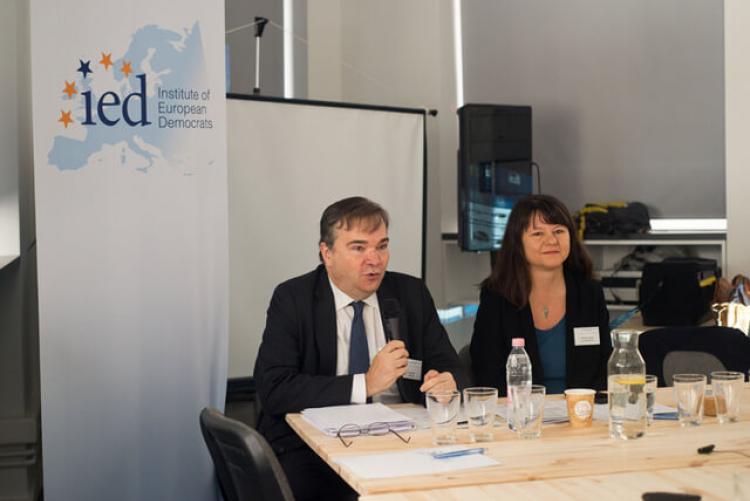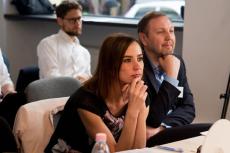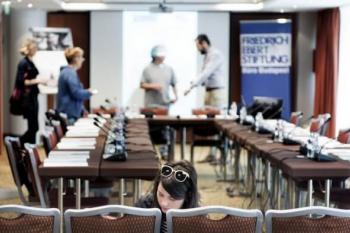A populizmus legyőzése
A Magyarországi Európa Társaság nemzetközi workshopot rendezett "V4Europe - Pieces of Populism in Europe and How To Overcome the Challange" címmel 2017. június 8-án a Kaptár közösségi irodában az Európai Demokraták Intézetével (IED) együttműködve és a German Marshall Fund of the United States támogatásával.
Sajtóvisszhang:
- Hegedűs István interjúja a Klubrádióban a populizmusról 2017. június 8-án (Audió melléklet).
- Európai Demokraták Intézetének beszámolója a workshopról (EN)
PROGRAM (EN)
Populist forces and politicians have marched from the fringe of political system to the forefront of public life challenging the dominant liberal order both in well-established and traditional as well as in relatively new-born democracies. Populists always divide societies into two parts, the corrupt elites and the pure people, whilst using simplistic communication methods in old and new media attacking liberal values and institutions. Beside the problems of categorization how to call and precisely define the characteristics of populist formations which call for a majoritarian concept of democracy, the reasons behind their increasing electoral support have been seriously debated worldwide.
First of all, while globalization brought an unprecedented development for the Western world, it has led to a deep sentiment of insecurity for people belonging to deprived social strata and groups. At least, since the 2008 global financial crisis we have seen that globalization has distributed wealth unevenly and pushed a large number of citizens into economic trouble. Secondly, the technological revolution has changed the ways and means of social communication and it has had enormous impact, both positive and negative, on political participation and partisan competition. Thirdly, migration waves, terrorism and geopolitical imbalances have created uncertainty with respect to traditional security concerns both in the Western and Eastern parts of the European Union. Fourthly, political cleavages have sharpened and have been polarized especially due to changing political agenda pushed by populist parties towards identity and cultural issues based on anti-liberal claims for national/ethnic/religious exclusiveness.
In a new political era, populist forces winning elections threaten dominant liberal values, undermine constitutional checks and balances, and build illiberal states in the Visegrad region, hence, inside the European Union. Still, in 2017, democratic and liberal political actors as well as representatives of the civil society seem to “clash back” in a significant number of member states of the European Union. Nevertheless, comprehensive political-ideological visions, institutional and structural renewal, fresh policy proposals have to be elaborated and implemented, whilst adequate professional communication skills are needed in the political arena to overcome the populist threat at national, regional and European levels.
AGENDA
9.15 – 9.30 Opening remarks
François PAULI, Member of the Board of the Institute of European Democrats (IED), Deputy Secretary-General of the ALDE Group, European Parliament, Brussels
Zsuzsanna SZELÉNYI, Member of the Hungarian Parliament, Member of the Hungarian Europe Society, Budapest, Member of the Board of IED, Brussels
9.30 – 10.00 Keynote speech
Milada Anna VACHUDOVA, Jean Monnet Chair in EU Studies, Associate Professor of Political Science, University of North Carolina at Chapel Hill
10.00 – 10.15 Coffee break
10.15 - 10.45 Keynote speech
Ivan VEJVODA, Permanent Fellow, Institute for Human Sciences, Vienna
10.45 – 12.15 PANEL 1:
THE IMPACT OF MIGRATION ON THE RISE OF POPULISM
Anna VISVIZI, Head of Research, Institute of East-Central Europe, IESW, Lublin (PRESENTATION and DISCUSSION PAPER: "Querying the Migration-Populism Nexus: Poland and Greece in Focus")
Márta PARDAVI, Co-President, Hungarian Helsinki Committee, Budapest
Bulcsú HUNYADI, Senior Analyst, Political Capital, Budapest
Moderator: Zsuzsanna VÉGH, Vice-chair, Hungarian Europe Society, Budapest
12.15 – 13.00 Lunch
13.00 – 14.30 PANEL 2:
POPULISM, ECONOMIC NATIONALISM, CORRUPTION
A new protectionism and a quest for re-nationalization of the competences in a multi-level European decision-making structure have been proclaimed based on the political and economic hardship of the crisis management inside the Euro-zone and low growth rates performed by the European economic model in general. The results of populist economic offer can be analyzed in practice in one of the member states, namely in Hungary, where state-led corruption, which is often related to the EU financial transfers, has spread over in the economic sphere as one of the most negative phenomena of the illiberal regime.
Bartłomiej E. NOWAK, Foreign Affairs Secretary, Nowoczesna, Warsaw (DISCUSSION PAPER: "Economic Populism and Protectionism")
Miroslav BEBLAVÝ, Associate Senior Research Fellow, Center for European Policy Studies, Member of the Slovak Parliament, Bratislava
Andrzej POTOCKI, Vice-President, European Democratic Party (PDE-EDP) and Vice-President, Stronnictwo Demokratyczne, Warsaw
Balázs VÁRADI, Senior Researcher, Budapest Institute
Moderator: Zsuzsanna SZELÉNYI, Member of the Hungarian Parliament and Member of the Hungarian Europe Society, Budapest, Member of the Board of IED, Brussels
14.30 – 14.50 Coffee Break
14.50 – 16.30 ROUNDTABLE:
THE POPULIST ZEITGEIST AND THE FOUNDATIONS OF A DEMOCRATIC, LIBERAL COUNTER-TENDENCY IN EUROPE
Introduction: Jacek KUCHARCZYK, President of the Executive Board, Institute of Public Affairs, Warsaw
(DISCUSSION PAPER: "On Populism")
Dániel HEGEDŰS, Research Consultant, Freedom House, Berlin and Member of the Hungarian Europe Society
Edit INOTAI, Senior Fellow, Center for Euro-Atlantic Integration and Democracy, Budapest
Milan NIČ, Senior Fellow, German Council on Foreign Affairs, DGAP, Berlin
Olga WYSOCKA, Deputy Director, Adam Mickiewicz Institute, Warsaw
Moderator: István HEGEDŰS, Chairman, Hungarian Europe Society, Budapest
16.30 – 16.45 Closing remarks
István HEGEDŰS, Chairman, Hungarian Europe Society, Budapest




















